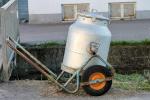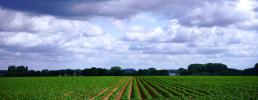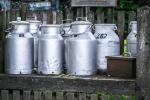H2020 AE4EU Project: Agroecology for Europe
- Type Project
- Status Filled
- Execution 2021 -2023
- Assigned Budget 1.999.886,25 €
- Scope Europeo
- Main source of financing Horizon 2020
- Project website Proyecto AE4EU
Agroecology is emerging as a one-way path for the development of sustainable agricultural and food systems in Europe. However, despite considerable efforts, full implementation remains limited. The EU-funded AE4EU project will contribute to research and innovation in the development of agroecology through several strategic objectives. The project will develop a plan for a European network of agroecological living laboratories, research infrastructures, and other related actors. Furthermore, it will map innovations and initiatives at the local, regional, and national levels in several European countries, providing an inclusive and accurate view of agroecology and facilitating the connection of funding schemes and policies. The project will also make recommendations for improving the funding of public and private agroecological research.
By bringing together partners from diverse backgrounds and activities, from universities to grassroots organizations, the AE4EU project delivered a variety of outcomes and products. Understanding the current realities of agroecology in different European countries is a key step toward leveraging existing initiatives and improving agroecology. To this end, the AE4EU project mapped agroecology in 33 European countries.
A unique overview was achieved documenting agroecology initiatives, including practice, research, education and training, the movement, and living laboratories. The results show that agroecology is still not widely recognized by different categories of actors; there are few agroecology education programs; the existence of research teams/departments working in agroecology remains scarce; and movements linked to agroecology were found in most countries, while calls for living laboratories as such were extremely rare. All country results are published in an open-access book. An analysis of current and past agroecology-related research projects, as well as institutions working in agroecology, was conducted, providing insight into how agroecology is understood and applied. In parallel, perceived barriers to the development of agroecology and associated research needs were identified.
The results clearly highlight the existence of different research approaches related to agroecology, ranging from more targeted research to very few studies using a broader, holistic approach, the need for a transdisciplinary approach, as well as the need to further involve a variety of stakeholders in research. The main lessons learned from this work were shared through deliverables, a webinar, and academic articles. Funding is key to supporting and enhancing the development of agroecology. The consortium provided an overview of existing public and private funding schemes dedicated to agroecology. Furthermore, the project initiated exchanges between private and public funders. Public funding programs were investigated through analysis of existing databases at national and European levels, and interviews with stakeholders related to public funding. This has provided insights into existing schemes and their evolution. The work on private financing through desk research, interviews, and workshops with foundations highlights the willingness of a group of foundations already directly or indirectly committed to financing agroecology to expand their participation or supplement existing funding.
Living labs and research infrastructures are key instruments and can be important initiatives to foster the agroecological transition. Using an original approach, the project defined a grid of indicators to characterize existing living labs and provide materials on how to group them and analyze the differences between living labs in relation to the type of stakeholders involved, as well as on how to monitor and evaluate existing living labs. In parallel, three living labs were developed in Italy, the Netherlands, and the United Kingdom. Fostering farmer training around agroecology is one of the key steps to scaling up their development. AE4EU partners developed training guidelines to disseminate and exchange knowledge on the approach and application of agroecology. Finally, to increase the connection between current and future actors in agroecology, the project has laid the foundations for two important initiatives: (i) the development of a European Agroecology Clearing House, and (ii) the creation of the ENAF European Network of Agroecological Food Systems.
The world is facing a myriad of challenges: soil degradation, water quality due to high nutrient concentrations and the appearance of pesticide residues that affect food quality and human health, biodiversity loss, significant food loss during processing and storage, food waste, and food access—many of which are severely impacting agriculture, food production, and food systems. The recent COVID-19 pandemic crisis, as well as the war in Ukraine, have further highlighted the need to promote a drastic change in agricultural and food systems in Europe. In this regard, agroecology is increasingly considered an important avenue, as it designs, develops, and promotes the transition to sustainable agricultural and food systems. Although agroecology and its various facets have developed to some extent in Europe (Nicot et al. 2018, Wezel et al. 2018b), this remains too limited to enable a successful transition to sustainable agriculture and food systems. Therefore, strong development is needed, with ambitious, long-term joint actions at the European level in research, innovation, training, education, and funding.
In order to promote and support the development of agroecology, the AE4EU project aimed to achieve six key strategic objectives (shortened):
- To increase connections between relevant actors through mapping agroecology in Europe, with the aim of describing and analyzing the different contexts, realities, and development status of agroecology.
- Develop skills and methods to develop research infrastructures and living laboratories.
- Prepare funders for increased and complementary funding of agroecology by analyzing public and private funding schemes to identify possible adaptations to improve funder cooperation and coordination.
- Improve human and social capital by creating a European Agroecology Exchange Centre as an online space to facilitate and promote knowledge exchange at the European level.
- Improve the capacity to adapt policy interventions to specific situations to enhance understanding of current policies that could support the development of agroecology and provide recommendations for future policies.
- Provide medium- and long-term research, innovation projects, initiatives, as well as improved knowledge and good practices.
The current situation in Europe clearly indicates that major changes are needed to develop sustainable agricultural and food systems. In this regard, agroecology is increasingly considered an important avenue for designing, developing, and promoting the transition to sustainable agricultural and food systems. Although agroecology and its various facets have developed to a certain extent in Europe, it remains too limited to date to enable a successful transition to sustainable agriculture and food systems.
This project will contribute to research and innovation development in agroecology through different strategic objectives. AE4EU will develop a roadmap and framework for a European network of agroecological Living Labs (LLs) and Research Infrastructures (RIs), and other relevant actors. The main avenues for this will be the mapping of the state-of-the-art and local, regional, and national initiatives in different European countries, also providing a more complete and detailed view of how agroecology is understood. This will lay the groundwork for connecting relevant actors from the identified initiatives, LLs, RIs, funding schemes, and policies. Furthermore, the project will identify and evaluate past and ongoing LL and RI agroecological initiatives and how they derive relevant and successful approaches for the transition to agroecological food and production systems. Furthermore, AE4EU will identify and analyze policy frameworks that include elements of agroecology and provide recommendations for their future reinforcement and adaptation.
The project will also develop proposals for potential changes and improvements for expanded and complementary funding from public and philanthropic/private funders to enhance agroecology research, practice, and innovation in Europe. The overall objective of AE4EU is to accelerate the transition to sustainable agricultural and food systems by developing strengthened networks and connecting a wide range of relevant stakeholders across Europe.
Agroecology is gaining momentum in various European countries through the development of the European Partnership on Agroecology, living laboratories, and research infrastructures. These dynamics reinforce the need to analyze the current state of agroecology in European countries, the opportunities to foster its development, and also to identify the barriers and forces that hinder it.
To this end, AE4EU played a key role by carrying out various tasks, such as mapping agroecology in different European countries and disseminating the results through webinars, open-access publications, brochures, and policy briefs. The European Agroecology Exchange Centre constitutes an important legacy of the project as a platform for dissemination and connecting stakeholders.
Complementarily, the creation of ENAF (European Network of Agroecological Food Systems) was initiated to foster connection and exchange among stakeholders in Europe. Furthermore, the development of a roadmap, proposals for improving funding schemes and research programs, as well as analyses of past and current living laboratories and research infrastructures, provide the basis for enhancing the development of agroecology in Europe and facilitating its successful implementation and transition in different countries.
- ISARA (ISARA)







